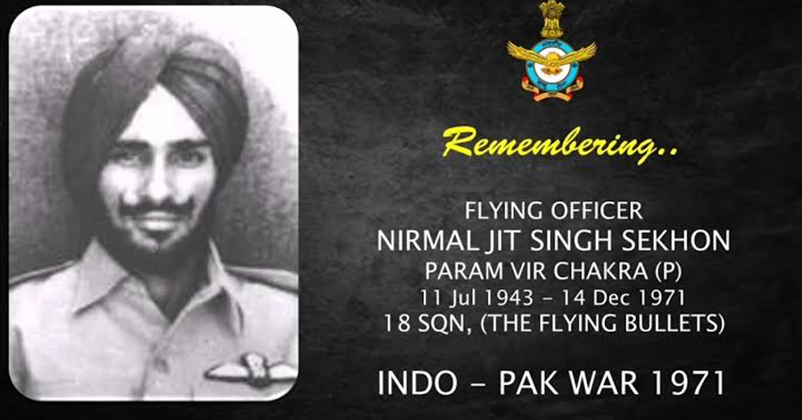14 December : "Param Vir Chakra Awardee: The Courageous Saga of Flying Officer Nirmal Jit Singh Sekhon in the 1971 Indo-Pak War"
Total Views |

Flying Officer Nirmal Jeet Singh Sekhon was an Indian Air Force pilot during the 1971 Indo-Pak War. He was posthumously awarded the Param Vir Chakra, India's highest military decoration, for his extraordinary courage and valor in defending the Srinagar Air Base against a wave of Pakistani air attacks. His heroic actions played a crucial role in thwarting the enemy's offensive.
Indo-Pak War 1971:
On 14 December 1971, Srinagar airfield was bombed and strafed by six Pakistani Sabre aircraft. Inspite of immense risk to life for attempting to take off during the air attack, Flying Officer Nirmal Jit Singh Sekhon of 18 Squadron, who was a Gnat pilot, took off and immediately engaged a pair of the attacking Sabres. He secured hits on one aircraft and damaged another. By this time four more Pak Sabre aircraft came to the rescue of their aircraft, which was locked in an air-combat with Indian Gnat. In the ensuing combat his aircraft was shot down by one of the Sabres. The sublime heroism, supreme gallantry and determination displayed by Flying Officer Sekhon in the face of certain death set new heights in Air Force traditions.
His citation reads:
Flying Officer Nirmal Jit Singh Sekhon was a pilot of a Folland Gnat detachment based at Srinagar for the air defence of the valley against Pakistani air attacks. In accordance with the international agreement dating back to 1948, no air defence aircraft were based at Sirinagar, until the outbreak of hostilities with Pakistan. Flying Officer Sekhon was, therefore, unfamiliar with the terrain and was not acclimatised to the altitude of Srinagar, especially with the bitter cold and biting winds of the Kashmir winter. Nevertheless, from the outset of the war, he and his colleagues fought successive waves of intruding Pakistani aircraft with valour and determination, maintaining the high reputation of the Folland Gnat aircraft. On 14 December 1971, Srinagar Airfield was attacked by a wave of six enemy Sabre aircraft. Flying Officer Sekhon was on readiness duty at the time. However, he could not take off at once because of the clouds of dust raised by another aircraft which had just taken off. By the time the runway was fit for take-off, no fewer than six enemy aircraft were overhead, and strafing of the airfield was in progress. Nevertheless, in spite of the mortal danger of attempting to take off during an attack, and in spite of the odds against him. Flying Officer Sekhon took off and immediately engaged a pair of the attacking Sabres. In the fight that followed, at tree top height, he all but held his own, but was eventually overcome by sheer weight of numbers. His aircraft crashed and he was killed. In thus, sacrificing himself for the defence of Srinagar, Flying Officer Sekhon achieved his object, for the enemy aircraft fled from the scene of the battle without pressing home their attack against the town and the airfield. The sublime heroism, supreme gallantry, flying skill and determination, above and beyond the call of duty, displayed by Flying Officer Sekhon in the face of certain death, set new heights to Air Force traditions.
Flying Officer Nirmal Jeet Singh Sekhon was posthumously awarded the Param Vir Chakra, the highest military decoration in India, on January 26, 1972. His selfless act of valor and indomitable spirit remain etched in the annals of Indian military history, inspiring generations to come.
Sekhon's legacy serves as a testament to the dedication and sacrifice of the brave men and women who defend their country. His contribution during the 1971 war stands as a shining example of the courage and resilience displayed by the Indian Armed Forces in the face of adversity.

